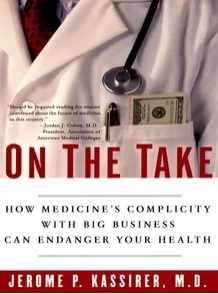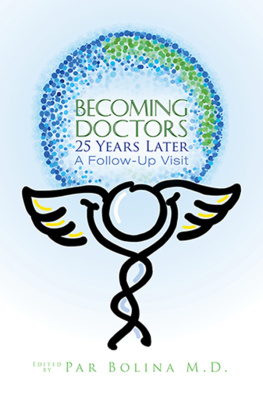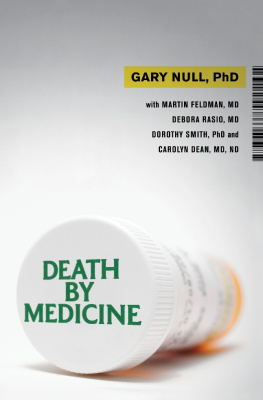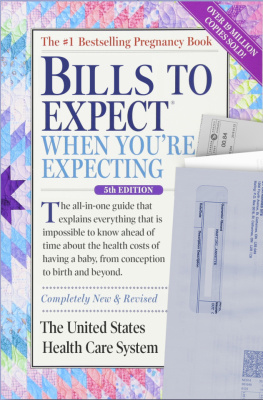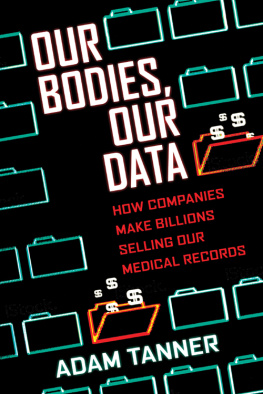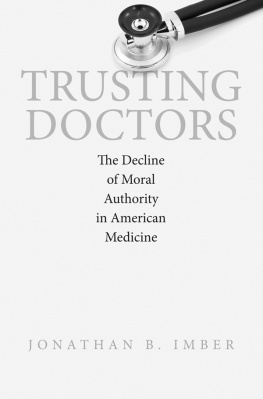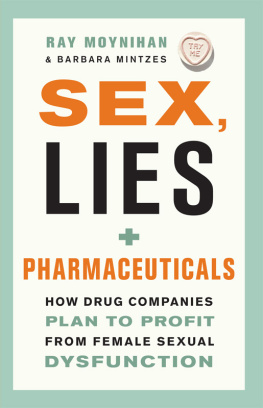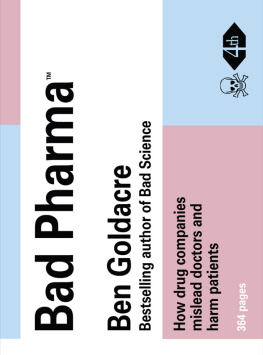Contents
Introduction
1 Free Gifts, Free Meals, Free Education, Special Deals
2 Money-Warped Behavior
3 Conflicts of Interest: Financial and Otherwise
4 Influenced by Gifts? Not I!
5 Your Doctors Tainted Information
6 Our Obliging Professional Organizations
7 Can You Trust Your Doctor?
8 Can We Trust Our Researchers?
9 How Did It Happen?
10 What Can Be Done?
Copyright page
Introduction
The desire for money is a powerful motivator, and our special brand of capitalism has relied on this incentive to make our country one of the most prosperous in the world. Most doctors eschew any commercial arrangements that might compromise their professional values, yet some have not resisted the buzz of a marketplace that values a profitable bottom line and promises enormous personal wealth. Today the income of many practitioners is several hundred thousand dollars or more, and for some, joining the ranks of academic medicine can be a ticket to great wealth and privilege. Given the expertise of our practitioners and researchers in diagnosing and curing us, and in finding new and better tests and treatments, few of us would begrudge them such wealth as long as we were confident that they are always using their talents and diagnostic tools in our best interests.
But are they? The time has come to ask whether all of the money floating around medicine has created a pattern of corruption. Have the fees that physicians charge given them an incentive to bring patients back to their offices too often or to order too many tests that arent needed? Or have they skimped on tests if ordering too many shrinks their paycheck? Are they more inclined to order certain expensive drugs or promote certain products be cause of personal financial relations with some of the drug companies, contrary to patients best interests?
Most people are accustomed to seeing trinkets bearing drug company names and logos in their doctors offices, but few are aware that the relations between many doctors and industry run far deeper. Away from the eyes of the public, the pharmaceutical industry captures the loyalty of physicians with gifts and lavish meals, pays them as consultants (even though they may do little or no consulting), funds their research, and pays for the expenses of their continuing education. Equally obscured is the willingness of many doctors to accept this largesse. Trinkets bloom into meals at fine restaurants; meals grow into speaking fees; speaking fees morph into ongoing consultations and memberships on drug company advisory boardspositions that command up to six figures a year.
A massive expansion of the highly profitable drug, device, and biotechnology industries, along with the addition of large sums of money for health care has transformed medicine from a sleepy mom-and-pop operation to one of the most successful businesses in an otherwise dormant economy.
Pharmaceutical companies have learned that their profits are at least as dependent on the power of their marketing efforts as the power of their scientific accomplishments, and they have pumped money into physicians pockets in many seemingly innocuous as well as many egregious ways. This enormous infusion of money has yielded financial incentives that many physicians find difficult to ignore. In turn, these incentives yield conflicts of interest that pit the physicians personal welfare against the welfare of their patients. They can exaggerate physicians financial expectations, impair their judgment, create deception, inflate medical costs, erode professionalism, and harm patients. I will tell the story of physicians everyday struggle between their professional responsibilities and their personal financial well-being.
In the middle of the twentieth century most doctors were in solo practice. Voluntary part-time faculty and a small cadre of full-time specialists populated the teaching staffs of medical centers. The principal rule governing professional behavior was the Hippocratic oath, which urged physicians in whatever houses they visit to come for the benefit of the sick, remaining free of all intentional injustice, of all mischief. The financing of medical care has moved the ethical compass from that simplistic, patient comes-first agenda to a more complex one, largely based on reimbursement for services. In the mid-1960s Medicare buttressed the fee-for-service system, which meant that physicians expected and received a fee for every visit and for most tests. But the consequent liberal spending under this payment system multiplied the cost of care, and soon insurers installed restrictive practices, hoping to control costs. Heath maintenance organizations (HMOs) became a major instrument of change. Under the HMOs, excessive charges were supplanted by restrictions of care. In fact, under both payment systems clinical practices had followed the flow of dollars. In time, as many physicians were threatened with a loss of income, they sought other sources of income. The pharmaceutical industry, and soon the biotechnology and device industries pumped huge sums into research and marketing. Much of the money was aimed at seducing practicing physicians and researchers to collaborate with the companies marketing strategies.
Academic medicine also flourished in the 1960s, led by major growth in federal training and research programs, and the ranks of doctors in academia swelled. Threatened by Japans industrial success and trying to copy it, Congress passed legislation that provided financial incentives for academic institutions and their researchers to patent their discoveries. Using patents from inventions of their scientists, presidents of major medical centers have eagerly tried to reap the institutional rewards of licensing agreements, but at the same time they have an abiding need to protect their faculties pure academic pursuits. One only has to wonder what effect the exploitation of faculty ingenuity has on the kind of research the scientists engage in.
Perverse incentives do not end, however, with individual physicians. Many medical professional organizations have also become much too close to industry, and their coziness with drug companies has influenced some of their professional and lay publications. Hidden financial conflicts of interest also dog decisions made by government agencies such as the Food and Drug Administration and the National Institutes of Health, and by panels of experts in professional organizations convened to issue clinical practice guidelines, policies that physicians use every day to diagnose and treat diseases.
Young physicians, now heavily in debt at the beginning of their careers from educational loans, are particularly vulnerable to industrys financial rewards, especially when they see their senior role models availing themselves freely of such largesse. Acceptance of lunches, dinners, and gifts from industry explains much about how idealistic medical students and house officers gradually become acculturated into accepting and later even demanding industry donations. There is a silent progression, from the innocence of accepting pens and pizza to a later winking nod that silently condones the gifts, and finally to a bland and unquestioning acceptance of pharmaceutical money by physicians as their careers advance.
The integrity of individual physicians and physician organizations is at stake. Most physicians who are close to industry swear that they are not and could not be influenced by a financial conflict of interest, yet this posture ignores what we know about human nature and the powerful influence of money. I am not nave enough to hope for or expect moral purity in the medical profession in an imperfect world where such an attribute is a rare commodity. All gifts do not have the same impact: a pen emblazoned with the name of a company or a sandwich from a friendly pharmaceutical representative probably does not have the same influence as a well-paid seat on a companys advisory board, and any approach to reform must recognize such differences. Yet each gift is personal, and our culture is such that we tend to reciprocate in some fashion, even for small favors.

